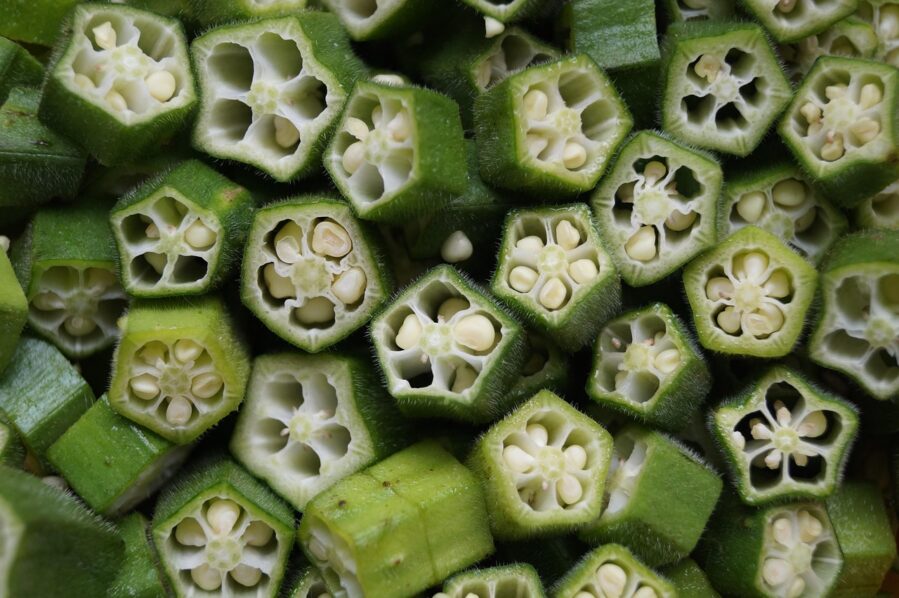In a surprising twist that could transform water treatment methods, the same slime that makes okra hard to handle and the gel from fenugreek seeds have proven remarkably effective at capturing and removing microplastics from various water sources. Scientists have discovered these plant extracts can remove up to 90% of microplastics from contaminated water – outperforming synthetic polymers currently used in commercial water treatment.
The findings, published in ACS Omega, showcase how everyday kitchen ingredients might provide an elegant solution to one of our most persistent environmental challenges. Researchers demonstrated that these natural substances effectively clump together with microplastics, causing them to sink for easy removal from water sources.
Dr. Rajani Srinivasan and her research team have been developing plant-based approaches to water purification as alternatives to synthetic chemicals. Their work focuses on utilizing the natural stickiness of certain plant polymers to attract contaminants, including the nearly invisible microplastic particles that have infiltrated virtually all water systems globally.
The researchers extracted the sticky polymers through a remarkably simple process. They soaked sliced okra pods and blended fenugreek seeds in separate containers of water overnight, then isolated and dried the resulting extracts into powders. Analysis confirmed these powders contained polysaccharides – natural polymers with adhesive properties.
When testing these extracts in controlled laboratory conditions, the researchers found that just one gram of either powder in a liter of water showed significant microplastic-trapping abilities. The fenugreek extract proved particularly effective, removing 93% of microplastics within an hour, while okra extract eliminated 67% in the same timeframe.
Perhaps most interestingly, a 50-50 mixture of the two extracts reached maximum efficiency within just 30 minutes, trapping 70% of microplastics. This combined approach might offer practical advantages in real-world applications where treatment time matters.
The team expanded their research beyond lab-created solutions to test actual water samples collected from various Texas waterways. Here, the results became even more nuanced, with each extract showing specific strengths depending on the water source:
- Okra extract performed best in ocean water, removing 80% of microplastics
- Fenugreek extract excelled in groundwater, eliminating 80-90% of particles
- The combined okra-fenugreek mixture worked most effectively in freshwater, removing 77% of microplastics
These varying results likely stem from differences in the types, sizes, and shapes of microplastics found in each water source. Such variations highlight the complexity of environmental microplastic pollution and suggest that tailored approaches might be necessary for different water treatment scenarios.
The research directly compared these plant extracts to polyacrylamide, a synthetic polymer commonly used in wastewater treatment facilities worldwide. In all tests, the natural extracts significantly outperformed this industry-standard chemical.
While polyacrylamide has proven effective for removing various contaminants, it introduces its own environmental concerns. The plant-based alternatives offer a potentially safer, biodegradable option that aligns with growing interest in sustainable water treatment technologies.
“Utilizing these plant-based extracts in water treatment will remove microplastics and other pollutants without introducing additional toxic substances to the treated water,” explains Srinivasan, “thus reducing long-term health risks to the population.”
The implications extend beyond just addressing microplastic pollution. As regulatory agencies worldwide increase scrutiny of synthetic chemicals in water treatment processes, nature-derived alternatives like these plant extracts could help utilities meet more stringent environmental standards while potentially reducing treatment costs.
The research represents a compelling example of biomimicry – looking to nature’s evolved solutions to address human-created problems. The sticky nature of okra and fenugreek, characteristics familiar to any cook who has worked with these ingredients, turns out to be precisely what makes them effective at capturing the tiny plastic particles contaminating our water.
As water treatment facilities face increasing pressure to remove microplastics and other emerging contaminants, these plant-based solutions offer a promising avenue for further development. Whether they will scale effectively from laboratory demonstrations to industrial applications remains to be determined through further research and pilot testing.
For now, the humble okra pod and fenugreek seed have demonstrated that solutions to complex environmental challenges might be found in unexpected places – including our kitchen cabinets.
If our reporting has informed or inspired you, please consider making a donation. Every contribution, no matter the size, empowers us to continue delivering accurate, engaging, and trustworthy science and medical news. Independent journalism requires time, effort, and resources—your support ensures we can keep uncovering the stories that matter most to you.
Join us in making knowledge accessible and impactful. Thank you for standing with us!

